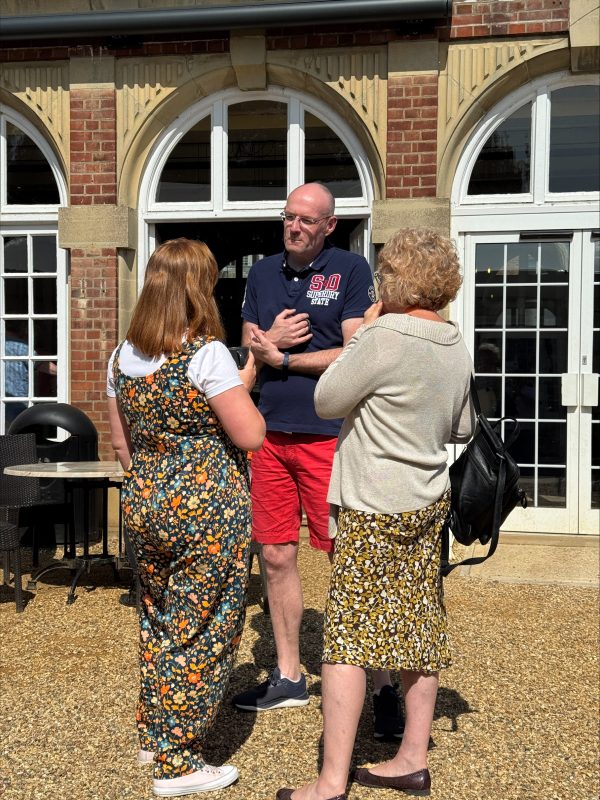More than 70 people gathered at High Leigh Conference Centre in Hertfordshire last month to explore the future direction of learning within the United Reformed Church.
Those gathered included leaders and educators from Resource Centres for Learning (RCL), the Newbigin Pioneering Hub and the Offices of General Assembly for the Education and Learning (E and L) consultation, held in direct response to Resolution Y* from February’s Assembly Executive (AE),
The consultation opened with worship led by the Revd Dr John Bradbury, General Secretary, focusing on words from John 21: 15-17: “Feed my lambs, tend my sheep, feed my sheep”.

The Revd Andrea Russell, Warden of Gladstone’s Library, and Victoria James, the URC’s Chief Operating Officer, facilitated creative and varied conversations. This enabled the exploration of the URC’s current E and L provision locally, regionally and denominationally and what the educational needs of the URC are for the mid-21st century. The group also explored things which might be done more effectively, using the resources and people currently available.
Working in small groups around tables and in whole session plenaries, participants explored hopes and fears, accepting that the difficult conversations were being held during a time of change and uncertainty. Each synod, RCL, the Newbigin Hub and the Offices of the General Assembly presented their current offerings. What was being done well was highlighted as well whether there were any obvious gaps.
Following feedback, the question “what does the identity of the URC bring to the table in the discussion” was considered. Tables considered specific groups, along with their training needs. A real focus was given to Eldership and the importance of the role of Elders and the need to equip them well.
“What will the URC E and L offering, as a whole, need to be delivering in five years’ time?” was also a question explored along with any barriers that may affect this; the provision’s design and delivery; the role that RCLs and the Newbigin Pioneering Hub will play; cohort size and whether mandatory training should be stipulated were topics examined.

The consultation ended with encouraging words from Andrea and the General Secretary.
The Revd Jenny Mills, Deputy General Secretary (Discipleship) said: “It was a full-on 24 hours with some spaces for worship, quiet and informal conversations, but a series of themes emerged around these questions.”
These themes were:
- Tensions surfaced and were acknowledged and concerns raised, named and heard.
- A shared understanding that the URC should be developing material denominationally but with local contextual adaptation and delivery, with a link between the whole cohort of those who develop and design the material/learning and those who will deliver it. Implicit in this is the need for a rationalisation of the current offer and that we must not keep reinventing the wheel.
- It was felt that there was a role for the RCLs in the development/design, but nothing to indicate the number of RCLs.
- Accreditation for training, where relevant, will sit at Assembly level.
- For this to succeed, “Train the Trainer” opportunities must be built in.
- To make the new way of delivery a reality, a culture of trust needs to be built so that synods use the resources rather than create bespoke local versions.
- It was clearly stated that we need data to help us consider the impact of training/learning.
- We need to better understand and communicate our learning outcomes and aims.
- It became clear that Elders were a core group who would benefit from a clear and consistent training framework. But that core and wider training needs to be developed in a similar way for other groups, too.
- Equipping people for leadership in a conciliar context is a key area of future learning.
- There were differing views on cohort sizes.
The Working Group who are overseeing the work on Resolutions X and Y from AE 2025, then spent a further 24 hours considering the ideas, discussion and feedback and will be producing a paper for July’s General Assembly, using the data collected at the event.
Thanks were expressed to all who attended and gave their time to be part of the consultation. Special thanks are expressed to the National Synod of Wales and the South Western Synod representatives who were unable to attend due to a clash with Ministers’ Spring Schools but gave a day in early April to feed into the consultation.
*Resolution Y
Assembly Executive instructs the Education and Learning and Business Committee Working Group to design and implement a review of the learning needs of the denomination, with facilitation and external support, and to bring back a needs analysis to July General Assembly 2025.
